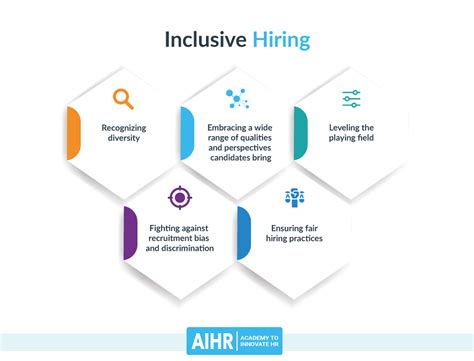In today's fast-paced and competitive job market, companies are constantly on the lookout for top talent to drive their businesses forward. However, finding the right candidates can be a daunting task, especially when it comes to building inclusive hiring teams. A diverse and inclusive team can bring a wide range of perspectives, ideas, and experiences to the table, leading to increased innovation, creativity, and productivity. In this article, we will explore the importance of building inclusive hiring teams and provide practical tips and strategies for achieving this goal.
The Benefits of Inclusive Hiring Teams
Inclusive hiring teams are essential for any organization that wants to stay ahead of the curve. By building a team that reflects the diversity of the community, companies can tap into a broader talent pool, increase employee engagement and retention, and improve their bottom line. Here are just a few benefits of inclusive hiring teams:
- Increased Innovation: Diverse teams bring different perspectives and ideas to the table, leading to increased innovation and creativity.
- Improved Decision Making: Inclusive teams make better decisions, as they consider a wider range of viewpoints and experiences.
- Enhanced Employee Engagement: When employees feel included and valued, they are more likely to be engaged and motivated, leading to increased productivity and retention.
- Better Business Outcomes: Companies with inclusive hiring teams tend to outperform those without, with increased revenue and profitability.

Strategies for Building Inclusive Hiring Teams
Building inclusive hiring teams requires a strategic approach. Here are some practical tips and strategies for achieving this goal:
- Define Your Diversity and Inclusion Goals: Clearly define what diversity and inclusion mean to your organization and set specific goals for building an inclusive hiring team.
- Use Inclusive Job Descriptions: Use language that appeals to a wide range of candidates and avoids bias.
- Cast a Wide Net: Advertise job openings in diverse channels to reach a broader talent pool.
- Use Blind Hiring Practices: Remove identifiable information from resumes and applications to reduce bias.
- Train Your Interviewers: Train interviewers to recognize and overcome their biases.
- Create a Positive Candidate Experience: Ensure that all candidates have a positive experience, regardless of the outcome.
Overcoming Obstacles to Inclusive Hiring
Building inclusive hiring teams can be challenging, especially when faced with obstacles such as bias, lack of diversity in the talent pool, and limited resources. Here are some strategies for overcoming these obstacles:
- Recognize and Overcome Bias: Recognize the biases that exist in your organization and take steps to overcome them.
- Partner with Diverse Organizations: Partner with organizations that specialize in diversity and inclusion to access a broader talent pool.
- Leverage Technology: Leverage technology to streamline the hiring process and reduce bias.
- Make the Business Case: Make the business case for inclusive hiring teams to stakeholders.

Best Practices for Inclusive Hiring
Here are some best practices for inclusive hiring:
- Use Diverse Interview Panels: Use diverse interview panels to bring different perspectives to the hiring process.
- Ask Inclusive Interview Questions: Ask inclusive interview questions that assess a candidate's skills and experience.
- Provide Clear Feedback: Provide clear feedback to all candidates, regardless of the outcome.
- Continuously Monitor and Evaluate: Continuously monitor and evaluate your hiring process to ensure it is inclusive and effective.
Measuring the Success of Inclusive Hiring Teams
Measuring the success of inclusive hiring teams is essential to ensuring that your strategies are effective. Here are some metrics to track:
- Diversity Metrics: Track diversity metrics such as the percentage of underrepresented groups in your workforce.
- Inclusion Metrics: Track inclusion metrics such as employee engagement and retention.
- Business Outcomes: Track business outcomes such as revenue and profitability.

Conclusion
Building inclusive hiring teams is essential for any organization that wants to stay ahead of the curve. By defining your diversity and inclusion goals, using inclusive job descriptions, casting a wide net, and creating a positive candidate experience, you can build a team that reflects the diversity of the community. Remember to overcome obstacles, use best practices, and measure the success of your inclusive hiring teams.






What is inclusive hiring?
+Inclusive hiring is the practice of actively seeking out and hiring candidates from diverse backgrounds, experiences, and perspectives.
Why is inclusive hiring important?
+Inclusive hiring is important because it allows companies to tap into a broader talent pool, increase innovation and creativity, and improve business outcomes.
How can I measure the success of inclusive hiring teams?
+You can measure the success of inclusive hiring teams by tracking diversity metrics, inclusion metrics, and business outcomes.
